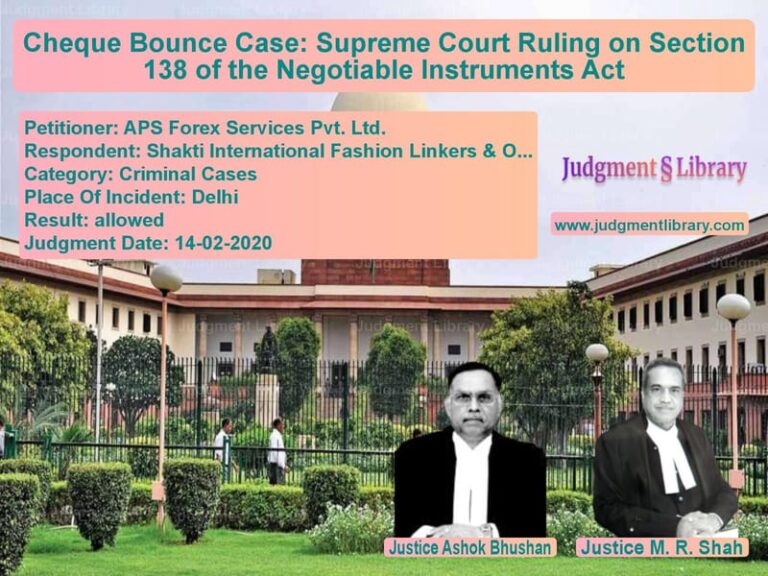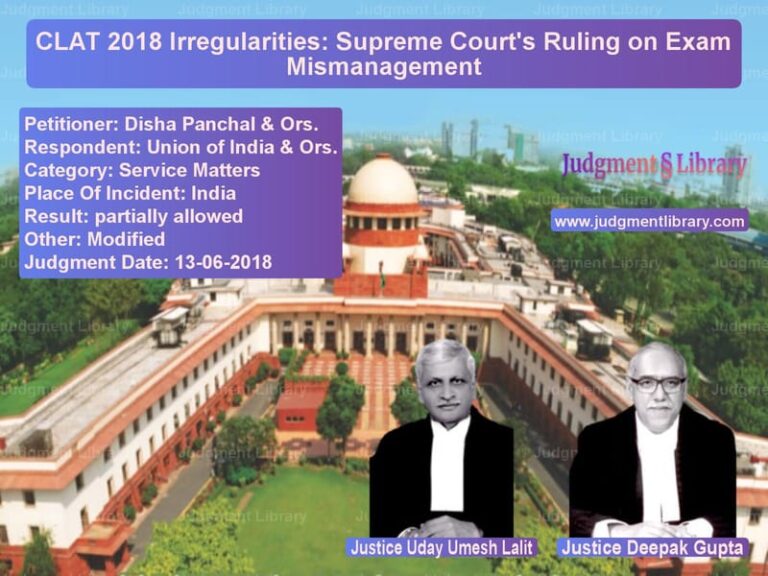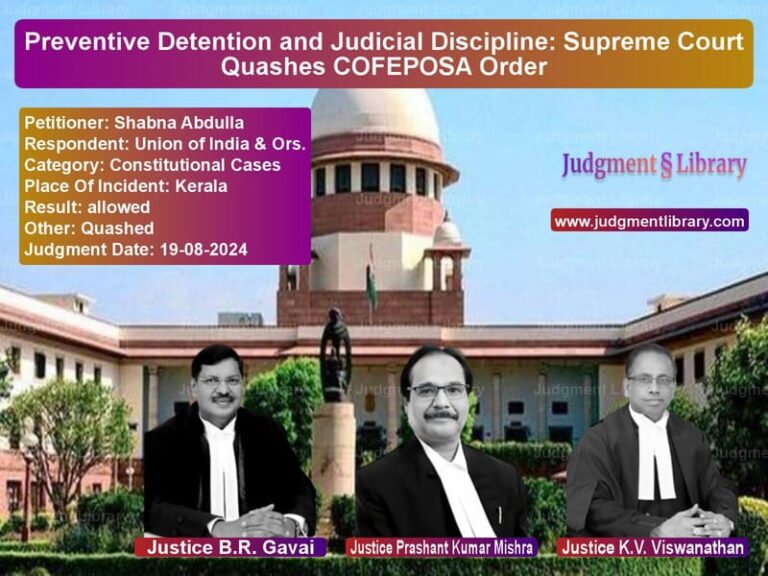Mutual Divorce Settlement: Supreme Court’s Ruling in Kuki Ravindran vs. Chendrimada Somaya Madappa
The case of Kuki Ravindran vs. Chendrimada Somaya Madappa is a significant ruling on mutual divorce settlement under Section 13B of the Hindu Marriage Act, 1955. The Supreme Court facilitated an amicable settlement between the parties, resolving a long-standing matrimonial dispute.
Background of the Case
The dispute arose between Kuki Ravindran and Chendrimada Somaya Madappa, who had been living separately for over 10 years. Multiple civil and criminal cases had been filed between them, including divorce proceedings, criminal complaints, and family court petitions.
The legal proceedings involved:
- A divorce petition filed before the II Additional Family Court, Chennai (O.P. No. 395 of 2009).
- Criminal proceedings, including an FIR (Crime Case No. 662 of 2010) before the Central Crime Branch, Chennai.
- A petition before the 2nd Family Court, Saket, New Delhi (Petition No. 172 of 2013).
- A criminal petition pending before the Madras High Court (Crl. O.P. No. 3918 of 2014).
Key Legal Issues
- Whether the marriage between the parties should be dissolved by mutual consent.
- Whether the Supreme Court should quash pending civil and criminal litigations in light of the settlement.
- Whether the settlement agreement was fair and should be made part of the judgment.
Arguments by the Parties
Arguments by the Petitioner (Kuki Ravindran)
- The parties had been living separately for over a decade, and there was no possibility of reconciliation.
- The disputes had led to multiple litigations, including criminal cases and family court proceedings.
- The parties had reached a mutual agreement and wished to resolve all cases amicably.
- The settlement agreement should be accepted, and the marriage should be dissolved by mutual consent.
Arguments by the Respondent (Chendrimada Somaya Madappa)
- She agreed to the terms of the settlement and confirmed that she wanted to end the marriage.
- She requested the Court to quash the pending cases, including the criminal proceedings.
Supreme Court’s Observations
On Mutual Consent Divorce
- “It is submitted that in view of the prevailing litigations between the parties and particularly taking note of the fact that they have been living separately for more than 10 years, their application under Section 13B of the Hindu Marriage Act is allowed.”
- “Accordingly, the marriage between the appellant – Kuki Ravindran and the respondent – Chendrimada Somaya Madappa is dissolved by way of a decree of mutual consent.”
On Quashing Pending Cases
- “In view of the settlement arrived at between the parties, we request the High Court of Judicature at Madras to dispose of Crl. O.P. No. 3918 of 2014 expeditiously.”
- “We direct the parties to take steps to put an end to the litigations, both civil and criminal, if any, pending between the parties in terms of the settlement arrived at between them.”
On the Settlement Agreement
- “The parties have reached a final settlement of the entire disputes. They have also filed a joint Memo of Compromise dated 09.01.2018 before this Court, duly signed by the parties and their respective counsel. The same is taken on record.”
- “The Joint Memo filed by the parties shall form part of this Judgment.”
Supreme Court’s Final Judgment
The Supreme Court granted mutual divorce and quashed pending litigations between the parties. The key directives included:
- The marriage between the parties was dissolved by mutual consent under Section 13B of the Hindu Marriage Act.
- The following cases were dismissed or quashed:
- Petition No. 172 of 2013 before the 2nd Family Court, Saket, New Delhi.
- FIR (Crime Case No. 662 of 2010) before the Central Crime Branch, Chennai.
- O.P. No. 395 of 2009 before the II Additional Family Court, Chennai.
- The Madras High Court was directed to dispose of Crl. O.P. No. 3918 of 2014 expeditiously.
- The parties were directed to end all pending civil and criminal cases in accordance with the settlement.
Legal Significance of the Judgment
This ruling establishes several important legal principles:
- Mutual Consent Divorce: The Supreme Court reaffirmed that long-pending disputes should be settled amicably when possible.
- Quashing of Criminal Cases: The Court exercised its powers to end unnecessary litigation arising from matrimonial conflicts.
- Binding Nature of Settlement Agreements: The ruling underscores that settlements filed before the Court become part of the judgment.
- Judicial Efficiency: The Supreme Court ensured that unnecessary delays in disposing of related cases were avoided.
Conclusion
The Supreme Court’s decision in Kuki Ravindran vs. Chendrimada Somaya Madappa highlights the importance of amicable dispute resolution in matrimonial cases. By granting mutual divorce and ensuring the end of all legal disputes between the parties, the judgment serves as a precedent for settling prolonged matrimonial litigations through fair agreements.
Don’t miss out on the full details! Download the complete judgment in PDF format below and gain valuable insights instantly!
Download Judgment: Kuki Ravindran vs Chendrimada Somaya M Supreme Court of India Judgment Dated 11-01-2018.pdf
Direct Downlaod Judgment: Direct downlaod this Judgment
See all petitions in Mutual Consent Divorce
See all petitions in Alimony and Maintenance
See all petitions in Judgment by Kurian Joseph
See all petitions in Judgment by Amitava Roy
See all petitions in allowed
See all petitions in settled
See all petitions in supreme court of India judgments January 2018
See all petitions in 2018 judgments
See all posts in Divorce Cases Category
See all allowed petitions in Divorce Cases Category
See all Dismissed petitions in Divorce Cases Category
See all partially allowed petitions in Divorce Cases Category






